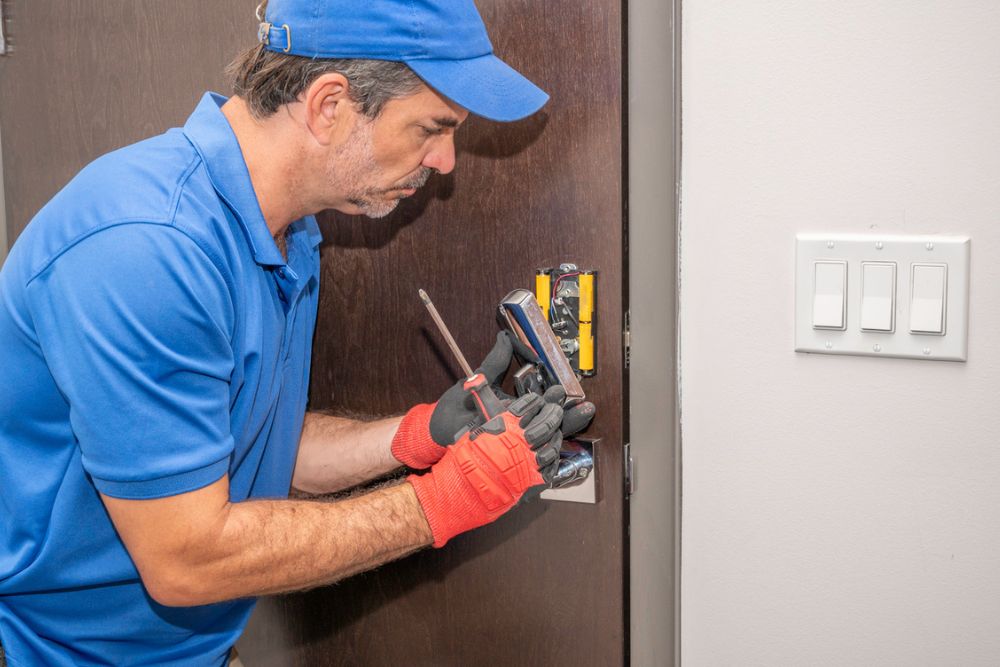Workers' Compensation Insurance for Locksmith Cost | 2025

Workers' compensation insurance cost for locksmiths in 2025 is $1.70 per $100 of payroll. On average, that’s $77 monthly per employee. This coverage benefits employees injured at work and protects the locksmith business from lawsuits.
What is Workers' Comp Premium for Locksmiths based on?

Industry Risk
The National Council on Compensation Insurance (NCCI) uses four-digit class codes to reference risk levels for various jobs. These risk levels assess the likelihood and severity of workplace injuries.
Locksmiths face mild risks, such as cuts from tools, falls from ladders, and strains from repetitive tasks. These risks contribute to low to moderate workers' comp costs. For more details, check out our guide to Workers Comp Codes for Locksmiths.

Payroll
The more locksmiths you employ, the more you’ll pay overall for workers' comp premiums. However, the rate per $100 of payroll stays steady.

Claims History
A clean claims history reduces premiums. Multiple claims for injuries like cuts or falls may increase your costs.
How are Locksmith Workers' Comp Premiums calculated?
Here’s the formula to calculate your workers' comp premium:
Payroll divided by 100 x rate = Premium

Step 1: Calculate the Payroll
Add up the total annual payroll for all locksmith employees.
If annual figures are unavailable, calculate each employee's hourly rate by multiplying it by weekly hours and then multiplying that by the number of weeks worked in a year.
Step 2: Find your Rate
Find the workers' comp rate for your industry and state:
Use the national average rate for locksmiths, which is $1.70 per $100 of payroll.
Check your existing policy for specific rate details.
Let’s work through an example together:
Let’s say you own a locksmith business in Missouri. You manage the store, and your team includes two skilled locksmiths and one receptionist.
Your team needs to be covered by a workers’ compensation insurance for locksmiths policy. Let’s figure out the premium using the formula.
Here’s the formula:
Payroll divided by 100 x rate = Premium
Step 1: Calculate Payroll
We need to calculate the annual payroll for each employee type:
Each locksmith earns $26/hour. Multiply that by 40 hours per week and 52 weeks per year for an annual payroll of $54,080 each. For two locksmiths, that’s $108,160.
The receptionist earns $19/hour. Multiply that by 40 hours per week and 52 weeks per year for an annual payroll of $39,520.
Step 2: Determine Rates
The locksmiths fall under class code 8010, which has a rate of $2.37 in Missouri.
The receptionist qualifies for class code 8810, which has a rate of $0.14 in Missouri.
Step 3: Apply the Formula
Now, let’s calculate the premium for each class code:
Class code 8010 (locksmiths):
$108,160 ÷ 100 x $2.37 = $2,563 annual premium
Class code 8810 (receptionist):
$39,520 ÷ 100 x $0.14 = $55 annual premium
Total annual premium: $2,618
Monthly Premium
$218 monthly premium
Annual Cost of Workers' Comp for Locksmiths (8010)
If you’re looking to estimate the workers' comp premium for a full-time locksmith, here’s what it might cost in different states.
.png)
Disclaimer: All data has been derived by combining ZipRecruiter national payroll averages per industry with average rates of a national carrier partner. Figures are for illustrative purposes only and do not include taxes or additional fees.
Does it matter where I buy a Policy from?
Absolutely! Locksmiths often work in varied environments, from high-rise buildings to private homes. The right coverage ensures your team’s protection.
Focus on these factors when selecting an insurance provider:
- Reputation: Look for a provider with excellent claim resolution reviews.
- Financial Stability: Ensure the company has the strength to cover claims reliably.
- Customer Service: Responsive support is critical for quick claim handling.
- Industry Knowledge: A provider familiar with locksmith operations can better address your risks.
What does Workers' Comp Insurance cover for Locksmiths?
A workers’ comp policy for locksmiths provides:
- Medical Expenses: covers treatment for illness or injury on the job
- Lost Wages: Compensates employees for lost income during recovery
- Death Benefits: Offers financial support to families in case of a fatal workplace accident
- Legal Protection: Shields your locksmith business from employee lawsuits
How can I make Workers' Comp cheaper?
Locksmith businesses can reduce workers' comp premiums with these strategies:

Create a Safety Program
A safety program is essential to address common locksmith hazards. Include these components:
- Ensure tools and equipment are in good working condition and inspected regularly to prevent malfunctions.
- Train employees to identify and mitigate risks like tripping over toolboxes, using ladders safely, and avoiding electrical hazards.
- Provide PPE, such as safety goggles, gloves, hearing protection, and dust masks, to protect against metal shavings, splinters, and noise pollution.
- Establish lockout/tagout procedures for equipment maintenance to prevent accidental starts.
- Encourage proper handling of heavy or awkward objects to reduce musculoskeletal strain.

Evaluate Driver Safety
- Hire drivers with clean Motor Vehicle Records (MVRs) to reduce accident risks.
- Conduct regular MVR checks and provide training on safe driving practices for mobile locksmiths.

Ask About Discounts
Discuss safety measures with your insurance provider and inquire about discounts for maintaining a strong safety program and low claims history.
Simplify Your Estimate
Find out exactly how much workers’ comp coverage will cost your locksmith business. Try our quick and easy online quoter for a precise estimate.
Note: The information provided in this blog is intended for general informational purposes only and is not a substitute for professional legal or insurance advice. Laws and regulations regarding workers' compensation insurance are complex and vary by state and by specific circumstances. Therefore, readers are encouraged to consult with a qualified legal or insurance professional to obtain advice with respect to any particular issue or problem they might have.

The question people ask us most often is, “Does my business need workers comp?” This often leads to the second-to-most frequently asked question: ”Do owners need workers comp?”



